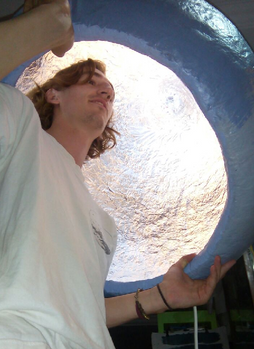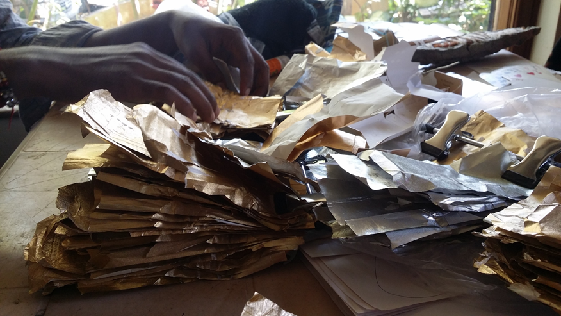DESING
DESING


Education

The Studio
Environmental Awareness
Skills and Solutions

The Studio
Waylon runs a studio that tests social and environmental interventions to provide an ‘afterlife’ to locally available materials. The studio validates collaborative social and educational models that include diverse human and non-human actors to envision sustainable futures. Past (and present) allies of the studio include architects, students, educators, musicians, builders, and crafters of urban-to-forest systems.
His studio aims push the envelope on the known lifespan of materials and products by containing environmental sensitivity within practical, upcycled lifestyle pieces. The studio serves as an epicenter of creativity, where multiple artworks, installations and projects are always in development. Products of the studio may differ in content, but are consciously created in perfect symphony with each other as well as the world around them.
Over the years the studio has channelled a wealth of urban detritus into addressing economic-environmental stressors via educational experiences, such as farm-to-table workshops, sustainable community building exercises, design thinking activities, land and marine permaculture, and documentation tours on craft and natural building.
Waylon designs educational experiences that enable co-teaching and co-learning. He aims to create toolkits for custodians and stewards of diverse ecosystems to observe, document and mimic and design better co-habitats.
At the Story of Light and Seesharp festivals (in 2015 and 2017, respectively), Waylon designed and led upcycling workshops based on circular economies to address micro plastics and insensitive urban lighting.
Waylon is always in the process of finding new and sustainable ways to inspire, derive and produce art, design and ideology. The studio represents the Waylon-In-Process (WIP) phenomenon.
Educative art and installations

however some turtle species eat jellyfish ....... are considered as keystone species ...and their ecosystems/breeding grounds have to taken care of(story of light) ....however increase of plastic in the sea....
A second installation examines the threat of plastic pollution to a keystone species: sea turtles. In the story of Akupara, a sea turtle who carries the world on his back, Hindu mythology pays homage to the pivotal role played by sea turtles to the health of marine and coastal biodiversity. Waylon believes that sea turtles are living proof of the ultimate ecological lesson: that everything is connected.
The population of sea turtles is threatened by coastal developments, which destroy their nesting sits and ruin their feeding grounds. Additionally, plastic pollution in the sea is often mistaken by the ancient creatures as food, and kills them by creating blockages in their digestive system. Half of sea turtles across the globe have ingested plastic (Link). Some starve after doing so, mistakenly believing they have eaten enough because their stomachs are full. On many beaches, plastic pollution is so pervasive that it impacts the reproduction rates of turtles by altering the temperatures of the sand where incubation occurs.
Waylon created a utilitarian installation in the sand, urging users of the beach to dispose waste responsibly, and building awareness through recreational discourse. The installation hopes to inspire behavioural change, especially in regard to consuming and managing waste in coastal areas.

Sea turtles are integral to food webs on land and the ocean. From the kind of food they eat, to the unhatched eggs and eggshells they leave behind on beaches, to the predators that hunt them, turtles uphold delicate balances in coastal ecosystems at multiple levels. They also aid in migration of smaller marine life, such as barnacles and small crustaceans.
Though sea turtles have been living and thriving in the world’s oceans for 150 million years, they are now in danger of extinction largely because of changes brought about by humans. If we alter the oceans and beaches enough to wipe out sea turtles, will those changes make it difficult for us to survive? And if we choose to do what’s necessary to save sea turtles, might we save our own future?
Charismatic creatures of the vast ocean, the sea turtles have survived adversities since the era of dinosaurs. But they are currently threatened because of the onslaught of anthropocentric oceanscaping . Watchkeepers of our ecological balance, these turtles help clean up the ocean by eating jellyfish and seaweed. In attempt to showcase their plight and help save them for years to come, we present to you the ‘Story of Light’.
Sea turtles demonstrate the ultimate lesson of ecology – that everything is connected.
Sea turtles are part of two vital ecosystems, beaches and marine systems. If sea turtles become extinct, both the marine and beach ecosystems will weaken. And since humans use the ocean as an important source for food and use beaches for many kinds of activities, weakness in these ecosystems would have harmful effects on humans.

Lighting The Way
with Divya karnad for Story of Light Festival 2015
A turtle hatchling's initial
obstacle course into the ocean

At the Story of Light festival (2015), Waylon drew attention to the problem of shoreline lighting on sea turtles by designing an empathy exercise for the public.

The perfect painting of the olive ridley sea turtle's life would be set against the backdrop of a dark, uninhabited beach. Light, in a sea turtle's life, brings both direction and chaos. Beach front lighting helps night owls party, but for baby sea turtles, it is the kiss of death.
Artificial lighting on beaches attracts freshly hatched sea turtle hatchlings towards them, causing them to head in the opposite direction away from the sea, leading them to their death.

Lighting the way is an interactive public installation meant to bring attention to the issue of sea turtle hatchling disorientation. Constructed in the form of a maze, the installation is meant to confuse and disorient visitors as they enter and navigate through it, through the use of mirrors, glass and light sources kept throughout the maze.
The installation aims to simulate the experience that sea turtle hatchlings go through, using a mirror maze which confuses visitors as they navigate through it.
The objective is to navigate through and find the way out of the maze using the
moon.
Different light sources were arranged across different sections in the maze to simulate the moon, which attract the visitor towards them. These light sources are meant to symbolize artificial lighting such as streetlights, signboards, traffic lights that are seen by the turtles from the shoreline and mistaken for the light reflecting off the sea.
The maze uses a combination of mirrors, reflective glass and opaque surfaces to create confusing illusions which make it difficult to navigate.

Chrysalis of a blue economy, 2015 - Seesharp festival and Serendipity arts festival
In a supplementary series of work entitled Urban Detritis, Waylon composes functional elements that seek to remediate the problem of sea turtle hatchlings being disoriented by urban coastal lighting while tackling the garbage-laden state of the beaches and their surroundings in Goa.

The Inspiration
Waylon created the Pod Lamps in an attempt to resolve imbalances in urban ecosystems. While witnessing and participating in countless environmental campaigns, awareness drives and clean-ups, Waylon found himself drawn towards shaping consumer habits, in addition to holding large corporations accountable for their products, packaging and recycling initiatives (or lack of these).
Citizens hold the power to shift balances in urban ecosystems by causing the acceptance and evolution of socially acceptable norms and behaviour. Waylon saw the opportunity to restore and enhance the rate of restoration as an offspring of nature, and decided to harvest waste from scenic relaxation spots frequented by locals and tourists alike.
The Pod Lamps comprise of discarded packaging from Torda Lake, Reis Magos, Vagator Hilltop, and Dona Paula sunset point, Each lamp contains over 400 cigarette packets, used paper plates, biscuit wrappers and cardboard boxes, in addition to other material. Restoring balance to urban ecosystems is labour intensive, and requires a full-time team of 5 people, studio space, storage space, and other materials that are hard to come by.

































































